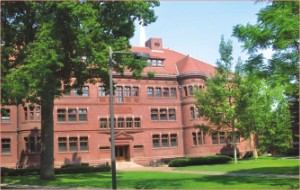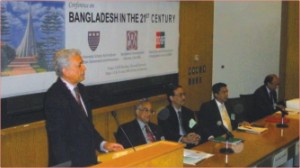Feature
Brainstorming at Harvard for a better Bangladesh
Abdul Mannan
 IT was a remarkable gathering of Bangladeshi diasporas and researchers, academicians, policy makers, social entrepreneurs and retired beauracrats, thousands of miles away from Bangladesh in one of the world's premium center of excellence, Harvard University, USA. They all gathered in the prestigious Ash Institute, John F Kennedy School of Government, Harvard University on June 13 for a two day conference on Bangladesh in the 21st. century jointly organized by Bangladesh Development Initiative (BDI), Democracy and Development in Bangladesh Forum (DDBF) and The Ash Institute for Democratic Governance and Innovation. The Ash Institute, the most ambitious undertaking of Harvard University in recent years, under John F Kennedy School of Government, was established in 2003 by Susan Berresford, the President of Ford Foundation, and her husband Roy Ash, a cabinet member in two US government administrations to address critical issues of governance and make governments more effective and responsive. Harvard itself is a private university in Cambridge, Massachusetts, US, and a member of the Ivy League. Founded in 1636 by the colonial Massachusetts legislature, Harvard is the oldest institution of higher learning in the United States. It is also the first and oldest corporation in North America. Harvard University was named after a young clergyman named John Harvard, who bequeathed the University (then college) his library of four hundred books and half his personal wealth, $1,500 in 1639. Previously Harvard was known as “New College” or “ the college at New Towne.” Today Harvard has the largest financial endowment of any non-profit organization except Bill & Melinda Gates Foundation, standing at $35.6 billion as of 2007 IT was a remarkable gathering of Bangladeshi diasporas and researchers, academicians, policy makers, social entrepreneurs and retired beauracrats, thousands of miles away from Bangladesh in one of the world's premium center of excellence, Harvard University, USA. They all gathered in the prestigious Ash Institute, John F Kennedy School of Government, Harvard University on June 13 for a two day conference on Bangladesh in the 21st. century jointly organized by Bangladesh Development Initiative (BDI), Democracy and Development in Bangladesh Forum (DDBF) and The Ash Institute for Democratic Governance and Innovation. The Ash Institute, the most ambitious undertaking of Harvard University in recent years, under John F Kennedy School of Government, was established in 2003 by Susan Berresford, the President of Ford Foundation, and her husband Roy Ash, a cabinet member in two US government administrations to address critical issues of governance and make governments more effective and responsive. Harvard itself is a private university in Cambridge, Massachusetts, US, and a member of the Ivy League. Founded in 1636 by the colonial Massachusetts legislature, Harvard is the oldest institution of higher learning in the United States. It is also the first and oldest corporation in North America. Harvard University was named after a young clergyman named John Harvard, who bequeathed the University (then college) his library of four hundred books and half his personal wealth, $1,500 in 1639. Previously Harvard was known as “New College” or “ the college at New Towne.” Today Harvard has the largest financial endowment of any non-profit organization except Bill & Melinda Gates Foundation, standing at $35.6 billion as of 2007
The morning on that Friday, June 13 could not have been better. Over three hundred and sixty years of Harvard's existence the university has managed to preserve not only its unblemished record of being the world's premium center of knowledge incubator but also its historic buildings and lush green surrounding. The university was on its summer vacation and though not much student activities were visible on campus, the tourists were seen arriving on campus along with the participants of the Bangladesh Conference, but for separate purposes. Harvard along with other old and historic universities in US is always a 'must go' attraction for tourists. Not many universities in the world have managed to create so many Noble laureates over last one hundred years as Harvard did. Forty-three current and former Harvard faculty members have been awarded Nobel Prizes since 1914, when Prof. T. W Richard brought the first Noble Prize for Harvard in Chemistry. Besides the Noble laureates on the faculty, Prize winners also frequently come to Harvard to serve as visiting faculty fellows. Many Harvard graduates have also won Nobel Prizes, including such notables as Theodore Roosevelt (Peace, 1906), T.S Eliot (Literature, 1948), and Henry Kissinger (Peace, 1973). The last Harvard Faculty to have won a Noble Prize was Professor Thomas C. Schelling in Economics (2005). Each old building has a history of its own and the Harvard community is proud of each of these. Harvard is also known for hosting world class conferences throughout the year, summer being a special conference season.
By the time Prof. Syed Saad Andaleeb, the President of BDI and one of the key organizers of the conference announced that the inauguration session would begin in a minute, the TSAI auditorium of The Ash Institute was packed with about three hundred participants and invited guests. Breaking away from the traditional conference approach Dr. Gowher Rizvi, the current Director of The Ash Institute welcomed the participants and guests to the conference.
Dr. Rizvi, a highly respected person in the academic world. While delivering his address of welcome Dr. Rizvi traced the political development of Bangladesh since its birth in 1971. He lamented that a country born out of so much of sacrifices of the common people could not achieve its potentialities over last three decades as democracy was often put on hold because of frequent military and quasi military interventions. He said Bangladesh to realize its full potential in the 21st. century must make all efforts not only to protect its democratic institutions but also to continuously reform them to keep pace with the demand of the time.
 Mr. Humayun Kabir, Ambassador of Bangladesh to USA in his inaugural speech said Bangladesh, a country striving to be a member of commonwealth of nations committed to democracy and development is currently going though a process of rediscovering itself and at the end it will be able to achieve its multifaceted objectives-ranging from return to democracy to eradication of poverty by 2020. In his keynote address, Professor Jamilur Reza Choudhury, Vice-chancellor of BRAC University said in spite of occasional setbacks Bangladesh has many success stories. Mr. Humayun Kabir, Ambassador of Bangladesh to USA in his inaugural speech said Bangladesh, a country striving to be a member of commonwealth of nations committed to democracy and development is currently going though a process of rediscovering itself and at the end it will be able to achieve its multifaceted objectives-ranging from return to democracy to eradication of poverty by 2020. In his keynote address, Professor Jamilur Reza Choudhury, Vice-chancellor of BRAC University said in spite of occasional setbacks Bangladesh has many success stories.
On both days of the conference about fifty papers on diverse issues such as Bangladesh's transition to democracy, evolving political development, foreign policy, natural resource management, education, infrastructure development, environmental challenges, health care, capital market, regional cooperation and security, micro finance, NGOs., etc were presented in different concurrent sessions by researchers and scholars from Bangladesh, USA, UK, Australia and Japan. On both days of the conference thematic seminars were given by Dr. Rounaq Jahan of Columbia University, Mr. Farooq Sobhan of Bangladesh Enterprise Institute, former Secretary Dr. Mashiur Rahman, Mr. Mamun Rashid of Citi Bank and Mr. Matiur Rahman, Editor of the Daily Prothom Alo. Dr. Rounaq Jahan in an hour long speech on 'Political Reforms: Players and Prospects' commented that political reforms have emerged as a major agenda item in public discourse in the last few years in Bangladesh.She lamented the present Caretaker Government in Bangladesh instead of focusing on institutional reforms unnecessarily personalized issues. She concluded her speech by saying that for a viable state of 21st. century crucial pillars of democracy, namely judiciary, parliament, the election commission and the independence of media must be protected.
Speakers in the concurrent sessions included Kazi F. Jalal of Harvard University, Joe Devine of University of Bath, Farida C Khan of University of Wisconsin, Ahmed Badruzzaman of University of California, Zillur R Khan of University of Wisconsin, Syeda Tonima Hadi of University of Hawaii, Abdul Mannan of the University of Liberal Arts Bangladesh, M Z Mamun of IBA, Dhaka University, Manzoor Ahmed of BRAC University and Bashir Ahmed Bhuiyan of Leading University, Sylhet. Speakers in the concurrent sessions in their presentations spoke on different issues relating to Bangladesh and praised the people of Bangladesh for their love for democracy and their courage in facing natural and political crisis. Different speakers discussed the present political impasse of Bangladesh and hoped that the country will revert to democratic process by the year end as announced by the Chief of the Care Taker Government through holding of a free, fair and credible election participated by all political parties.
The concluding session held in the afternoon of June 14 was co-chaired by Dr. Syed Saad Andaleeb and Dr. Kazi F Jalal. Speakers in the closing session included Ambassador Humayun Kabir, Mr. Farook Sobhan, Dr. William M Winkley, Dr. Manzoor Ahmed, Dr. Zillur R Khan and Dr. Farida C Khan. Summarizing the two day conference the speakers emphasized that the future of Bangladesh is getting more connected with global community and if it desires to be part of the global community it will have to prepare itself in all fronts matching the aspirations of its people and the outside world. The speakers commented that under the changed geo-political scenario no country can insulate itself from rest of the world. Bangladesh's relation with India and its other neighbours must improve substantially and SAARC must be made more effective to transform the Sub-continent into a competitive region. The 'winner takes all' attitude in Bangladesh's politics will have to go permanently and the parliament will have to be made the centre of all political decisions in future.
Professor Abdul Mannan is a former Vice-chancellor of Chittagong University. Currently he teaches at the University of Liberal Arts Bangladesh. He can be reached at abman1971@gmail.com.
|
